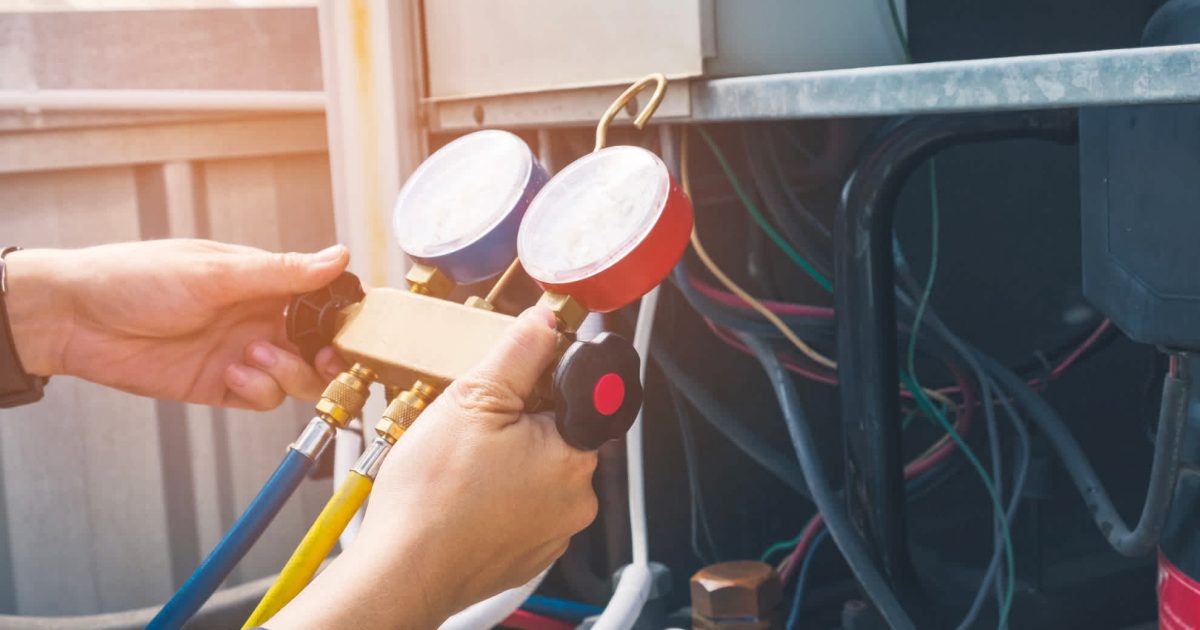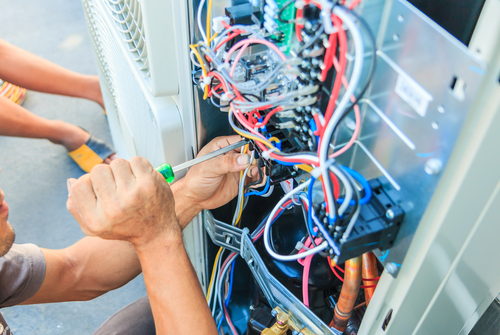Send unlimited invoices for free!
Create free accountIndustry-specific templates with customizable options.

An HVAC technician installs, repairs, and maintains heating, ventilation, and air conditioning systems in order to improve the climate and air quality of a home or commercial property. Services can include new installations, warranty or emergency repairs, as well as answering customer’s questions and offering recommendations on future work.
If we could automate this work with our HVAC software we would, but since we can’t, we know how essential reliable technicians are to your business. HVAC systems involve complex wiring and potential safety hazards, so if you do decide to hire a new team member, go slow and make sure you offer a job to the best possible candidate.
Is it a good time to start attracting talented technicians? A few years ago, there were over 332,900 qualified HVAC techs in the United States alone—and according to the Bureau of Statistics, that number is only going up. Take a look at this sample HVAC job description and use it as a template to encourage the best of the best to join your team.
In this post, we’ll also look more closely at things you should consider when putting together your job listing and weighing different candidates.
HVAC Technician Job Listing Template
While the type of HVAC technician job description will vary depending on the position, this template will generate qualified leads so you can attract the most experienced and enthusiastic professionals to your business:
Summary
Local residential HVAC company is looking for an experienced and self-motivated technician to add to our growing team. This is a permanent, full-time position with benefits and a competitive HVAC salary. We supply all techs a cell phone, service vehicle, and tools, We also offer continued training opportunities. Come be part of our tight-knit team!
Job Responsibilities
In this job, you will install, troubleshoot, and maintain all types of HVAC equipment including air conditioners, furnaces, humidifiers, water and air-cooled systems.
You will prepare quotes and educate homeowners on their options.
You will also be responsible for maintaining inventories, supply requests, and work orders.
This is a 40-hour a week job with possible overtime. In addition, all technicians serve one weekend a month on-call.
Qualifications and Technical Requirements
- EPA Certification
- NATE certification preferred, but not required
- A minimum of three years on-the-job experience
- Ability to lift up to 50 pounds
- Valid driver’s license and a clean driving record
- Excellent customer communication skills
- Dedication to being on-time, working safely and
- Drug screening and background check are required
- Authorized to work in the U.S.
Benefits
- Company subsidized health, dental, and vision
- 401(k) plan with company matching
- Paid vacation and holidays
- Use of company vehicle with gas reimbursement
- Commissions on large sales
- Tool purchase program
How to Apply
To apply, please send a resume and cover letter. In the cover letter, please answer the following questions in individual paragraphs:
- What area of the HVAC industry are you the most interested in?
- Describe a particularly challenging assignment and how you fixed it.
- How has your prior experience prepared you to work for us?
Equal Opportunity Employer
We are an equal opportunity employer and all qualified applicants will receive consideration for employment without regard to race, color, religion, gender, sexual orientation or preference, gender identity, national origin, disability status, protected veteran status, or any other characteristic protected by law.
Detailed Look at How to Hire an HVAC Technician
Next, we’ll dig into the specific skills and qualifications you should consider when hiring a new technician. Use the links below to jump to a particular section of interest.
Want to know more about what an HVAC job description looks like so you can hire the perfect technician for your company? Use the links below to jump to any questions you have or keep reading for an in-depth look.
- What General Skills Should an HVAC Candidate Have?
- What Qualifications Does an HVAC Technician Need to Work for My Company?
- What Education Details Should I Look for on a Prospective Technician’s Application?
- When Would I Need to Hire an Extra HVAC Technician for My Business?
What General Skills Should an HVAC Candidate Have?
In 2016, nearly 400,000 qualified HVAC technicians were servicing customers across the United States. The Bureau of Labor Statistics estimates that the demand for HVAC technicians will increase by 15% over the next several years—meaning there will be a lot more trained professionals in the market. So what qualities make an amazing HVAC technician stand out above the rest? Let’s take a look at some skills to include within your job description.
Typical duties you might want to include in an HVAC job description are:
- Installing, connecting, and adjusting new thermostats in both urban and industrial environments
- Repairing or replacing defective heaters, air conditioners, and refrigeration systems
- Performing standard maintenance duties to increase system efficiency such as changing filters, cleaning ducts, or refilling refrigerants
- Cutting or drilling holes in a building’s structure to better accommodate a HVAC system
- Testing electrical circuits, carbon monoxide monitors, and smoke detectors to ensure all safety precautions have been taken
- Examining blueprints to a building when updating or replacing an HVAC system
- Testing tubes and pipes for leaks and then repairing faulty equipment
- Installing low-voltage electrical wiring
- Collaborating with marketing and engineering professionals to create product definitions and instructions that make sense to the everyday consumer
- Troubleshooting any sort of HVAC problems in regards to temperature control, humidity control, air flow, etc.
- Mounting new HVAC equipment onto walls, roofs, and floors
- Responding to after-hours emergencies as needed
- Using HVAC software to schedule appointments and manage customer payments
- Consulting clients on how to make their HVAC systems more energy efficient and eco-friendly
- Working with computerized systems to fix bugs or install software updates
An HVAC technician job description should be thorough and it should note your company’s area of emphasis.
While many technicians work with all HVAC systems, your business is likely specialized in a single area. This could include exclusive work with refrigeration systems in the food processing industry, or perhaps thermostats in a home environment. You want to make sure your candidate knows which field they’ll be working in.
What Qualifications Does an HVAC Technician Need to Work for My Company?
The quality of interior air is an important factor for creating a safe and comfortable environment. Whether it’s at home, at work, or in a public building, HVAC technicians play a major role in regulating our indoor spaces so it’s important to hire a qualified professional for your business to carry out these critical tasks.
All HVAC technicians need formal training through post-secondary education at a trade or technical school. As you probably already know, students usually complete an apprenticeship under an experienced technician before fully entering the job market. Once they move into an entry-level position, there are many certifications they can pursue to qualify for specialized work and demonstrate specific skills.
Before choosing a technician for your business, make sure you’re familiar with HVAC technician requirements so you know your systems are in good hands. HVAC requirements change depending on which state you live in, but standard qualifications include:
- A high school diploma
- Completion of an accredited HVAC program of 6 months and 2 years, or completion of a 3 to 5 year on-the-job apprenticeship
- Industry, state, and national certifications and licenses
- An EPA certification for technicians who work with refrigerators
In order to avoid HVAC invoicing mistakes or faulty repairs, ask your technician to show you which certifications they have completed. Have they worked for another HVAC business? Make sure to ask for references to get a feel for their work ethic.
What Education Details Should I Look for on a Prospective Technician’s Application?
When you’re considering a job candidate, it’s important to look at his or her full educational history. Below are examples of what an ideal HVAC candidate should have listed on their resume.
Primary education:
- A high school diploma or GED
- Aptitude in STEM (science, technology, engineering, and math) fields
- While STEM expertise isn’t necessary, the complex technical training involved in HVAC is made easier with a good grasp on mechanics, physics, and chemistry
Academic training:
- Prospective technicians can receive a certification, Associate’s degree, or Bachelor’s degree to gain necessary training – look for evidence of formal classes on an application
- Courses range from HVAC technology to industry code standards, and it’s important to have a broad range of knowledge.
- Make sure the technician took classes at an accredited institution
On-the-job training:
- If the technician didn’t complete a formal education, look for proof of a 3 to 5 year paid apprenticeship
- Ensure that on-the-job training was carried out by an experienced HVAC technician, if possible get the mentor’s phone number for a reference
- Look for required 2,000 hours of hands-on training and 144 hours of technical education
- Some common apprenticeships you might see listed on a resume are managed by:
- Air Conditioning Contractors of America, Inc.
- Associated Builders and Contractors
- US Department of Labor Apprenticeship USA Program
Professional certifications:
- This step varies by state, and different industries have different requirements for professional certifications.
- Popular certifications are offered by:
- North American Technician Excellence
- Refrigerating Engineers and Technicians Association
- HVAC Excellence
- Environmental Protection Agency
Soft skills:
In addition to the above qualifications, there are several “soft” skills an HVAC technician should possess to be successful in the workplace. These include:
- Listening: A technician needs to be able to accurately diagnose a problem when a customer requests your services, and careful listening is the first step.
- Good communication: Make sure technicians you hire have great communication skills. Much of an HVAC technician’s job involves following up with customers before and after completing the service to keep them in the loop. This involves speaking to them in person, over the phone, and by email.
- Time management: Tardy technicians rarely receive repeat clients.
Critical thinking:
HVAC systems can often be a puzzle to figure out, so a prospective HVAC technician must be competent at finding creative solutions to difficult problems.
When Would I Need an Additional HVAC Technician for My Business?
Your business can’t be run without great people. If your small business is growing, your staffing needs may change. Not sure if now is the time to add more technicians to your team? Keep the following considerations in mind.
When to hire more technicians:
- You’re spending too much time on non-critical business tasks: Is your work-life balance suffering because you’re consistently working around the clock to meet your customer’s needs? When you get home from work, do you find yourself finishing up extra to-do list items that didn’t get finished during the day? Are you stuck in an endless loop of administrative obligations instead of being out in the field or delegating jobs to tasks? If you’ve answered “yes” to most of these questions, it’s a good idea to look into getting extra help.
- The customer experience is not up to par: Are you getting negative reviews due to long wait times? Even if you and your staff work overtime to make customers happy, things can still easily slip through the cracks. Maybe customer inquiries have gone unanswered and you’re losing valuable prospective clients. If you’ve noticed an uptick of customer complaints, it might be time to expand your team to better serve customers and respond to negative reviews. Happy customers mean repeat customers, after all.
- Your staff is burned out: Everyone has tough weeks at work where the list of tasks seem never-ending. But have you noticed your employees are having issues keeping up with their jobs? Do you notice a lack of enthusiasm and drive among dedicated employees? Is your technicians’ attention to detail suffering? Are people calling out sick more often? Don’t ignore these red flags, these are signs that your employees are burned out. Adding more employees can help spread out the workload more efficiently and provide your customers with better service.
- Keep the bottom line in mind: When you’re trying to determine the right number of employees to add to your business, don’t forget about your overall budget. Only hire as many people as you truly need so you won’t dig into your own profits if you don’t see an increase in sales.
Reliable technicians are priceless. HVAC systems involve complex wiring and potential safety hazards, so if you do decide to hire a new team member, go slow and make sure you offer a job to the best possible candidate.
Next Steps: Posting Your Listing and Vetting Candidates
Once you’ve completed your job listing, the next step is to post it on your website and to job listing sites. In our HVAC Technician Hiring Guide, we dig into where to search for HVAC talent, as well as how to interview, train, and manage them.










